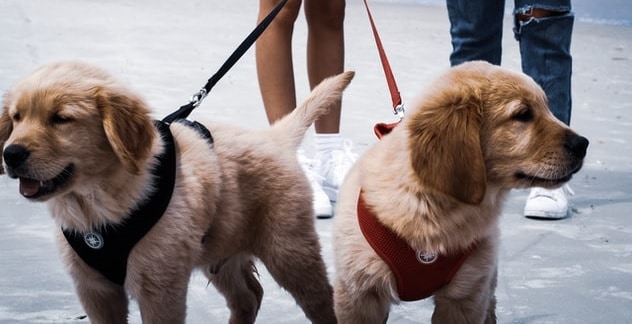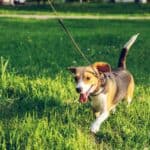Besides being a responsibility, daily walks with your dog can be a pleasant and relaxing activity, in which you can weld the relationship of affection and trust with your pet. However, they can also turn into a real nightmare, in cases where your furry friend never stops tugging. Here’s what you can do to make your dog stop pulling on the leash .

The dog must learn not to pull on the leash
It can be seen that many dog owners seem to have gotten used to it, even going so far as to assume that pulling on the leash is an inevitable natural factor. They prefer to live with this situation, which is stressful for them as well as for the animal, rather than trying to find a solution to it.
However, we must start from the fundamental idea that a dog is not born knowing the correct way to walk with a leash around his neck . It goes without saying how this point should be included in the rules underlying his training.
Like any teaching, it must be imparted with good doses of patience, tenacity, consistency and gentleness. This way, sooner or later you will get your dog to stop pulling on the leash.
Getting to train your furry friend not to pull the leash becomes essential so that your walks together constitute a moment of pleasure, rather than a situation with unbearable implications.
Get him used to the leash
The first goal is to get the dog to relate the leash with an idea of positive experience . How? The ideal is that he gets used to using it since he was a puppy, but don’t worry if you have adopted an adult specimen: there is always time to learn something new.
Start by putting him on a leash while you are at home, playing together, giving him rewards and encouraging him for his good behavior.
Similarly, even if the animal is already used to being on a leash, it is still worthwhile to dedicate some time to a play session before going out on the street . Thus he will take the walk with greater relaxation, having consumed a good dose of energy. This will surely take away from him a lot of desire to go all over the place, tugging at you all the time.
If you want him to stop pulling on the leash, avoid doing it too
It’s important that you don’t even get tempted to pull the leash . If you both fall into the trap of this push and pull, you will never get along. Your pet can become stressed or even harmed , and that is certainly not your goal.
You have to face the walks with tranquility and safety. Show your dog that you are holding the reins, in this case the leash.
If he starts to jerk, it is better to stop the walk until he calms down, or to change the direction of the path. If you can make him relax and also get back on his way normally, compliment him on his good behavior and reward him with food he is crazy about.
Remember that Positive Reinforcement always gives good results in pet education. On the contrary, punishment and mistreatment only complicate things.
Additional tips for avoiding jerks
Other factors to consider to stop your furry friend from pulling on the leash are:
- Walk at a good pace . Since dogs tend to go faster than people, if you walk very slowly he may become anxious and start jerking.
- Allow him to do what is normal for his species during the walk : sniffing, urinating at the base of trees, interacting with other dogs and so on
- Choose a suitable leash and the most suitable accessories . This aspect depends on the size, strength and personal nature of the animal. Ask for professional help so that they recommend the best equipment according to its characteristics.
- Avoid going out on the street if your dog shows signs of distress or anxiety . Better to wait for him to calm down. A good trick is to not let him notice that the time for the walk is approaching. So you will surely be able to lower his anxiety levels.
- Treat it with affection without neglecting firmness . In this way you will get him to feel safety by your side, leaving aside any anxieties and fears .






